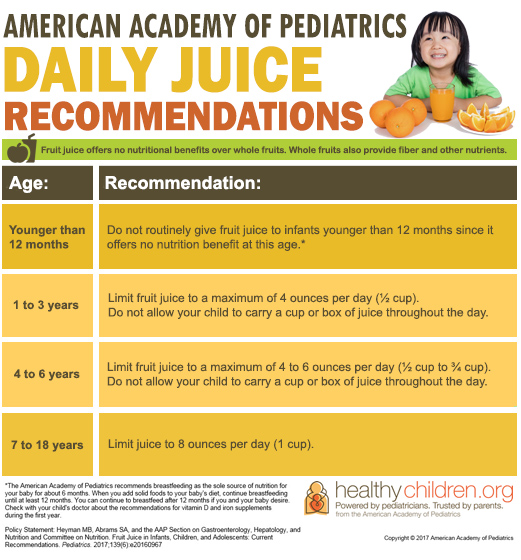Juice that comes from fruit is not the same thing as eating fruit. It's missing the fiber and even the feeling of fullness that comes from eating foods rather than drinking. Too many kids drink excessive juice, which fills them with empty calories and can contribute to obesity and tooth decay.
How much juice should kids have?
- Juice is not recommended at all under 1 year of age in the new guidelines.
- Toddlers from 1-3 years can have up to 4 ounces of 100% juice a day.
- Children ages 4-6 years can have 4-6 ounces (half to three-quarters of a cup).
- Children ages 7-18 years can have up to 8 ounces (1 cup) of 100% fruit juice as part of the recommended 2 to 2 ½ cups of fruit servings per day.
General tips and tricks:
- Offer only 100% juice if you're giving juice at all. Fruit flavored drinks are not the same thing as juice.
- Water is always healthy! If your kids want it flavored, cut up fruit and put it in the water. There are many recipes online to get ideas, but kids don't need anything fancy - just put cut up pieces of their favorite fruit with water in a glass container. Put the container in the refrigerator for 2-4 hours and then pour the infused water into their cup without the fruit (which could pose a choking risk). The infused water will stay fresh in the refrigerator for up to 2 days.
- Some kids like to start the day with a frozen water bottle. Simply put a 1/2 to 3/4 full water bottle in the freezer overnight - don't fill it too much because ice expands! Add a bit of water in the morning to help it start melting so it's drinkable when they want a sip. Adjust the amount of water to freeze as needed depending on how insulated your water bottle is.
- If your kids demand more than the recommended amount of juice for their age per day, water it down. By mixing water (or sparkling water for a bit of zip) with juice, you decrease the amount of sugar in every serving. You can give 1/2 the recommended daily maximum amount of juice with water twice and still stay within the daily limit.
- Never let kids drink juice out of a bottle.
- Never put kids to bed with juice. They should brush teeth before bed and be allowed only water until morning.
- Offer only pasteurized juice. Unpasteurized juice can cause severe illness.
- Give kids real fruits and/or vegetables with every meal and snack.
- Make smoothies! Putting fruits and vegetables in a blender to make a smoothie is a great way to give the full fruit or vegetable instead of juice. Consider adding plain yogurt**, chia, flax, oats, nuts, and other healthy additions to increase the nutritional components of the smoothie! **Flavored yogurts often have added sugars. Look for just milk and cultures in your yogurt.
- Most juice boxes have more than a day's supply of juice. Don't use juice boxes. Offer juice in cups so you can limit to the age appropriate amount.
- Organic juice is not healthier than other juice. Many parents presume it has less sugar or more nutrients, but it doesn't.
- Vegetable juices may have less sugar and fewer calories than in the fruit juice, but are often mixed with fruit juices so you must read ingredients. They also lack the fiber of the actual vegetable, so eating the vegetable (or pureeing veggies into a smoothie) is healthier.
- Beware of labels that look like juice but aren't 100% juice. The label might say "juice cocktail," "juice-flavored beverage" or "juice drink." Most of these have only small amounts of real juice. Their main ingredients are usually water, small amounts of juice, and some type of sweetener, such as high-fructose corn syrup. Nutritionally, these drinks are similar to most soft drinks: rich in sugar and calories, but low in nutrients. Avoid them.
- Sports drinks are not healthy substitutes for water. They are sugar-sweetened beverages that contain sodium and other electrolytes. Unless one is doing high intensity exercise for over an hour (such as running a marathon, not playing in a baseball tournament), water and a regular healthy diet provide all the calories and electrolytes we need.
- Water's the best drink for our bodies. Buy fun reusable water bottles and challenge your kids to empty them throughout the day. The old rule of "8 cups a day" is outdated, but we should get enough water (from the water content in foods + drinks) to keep our urine pale. We need more water when it's hot, when we exercise, when we're sick and when the air's really dry. Once we feel thirsty we're already mildly dehydrated, so drink water to prevent dehydration.



No comments:
Post a Comment